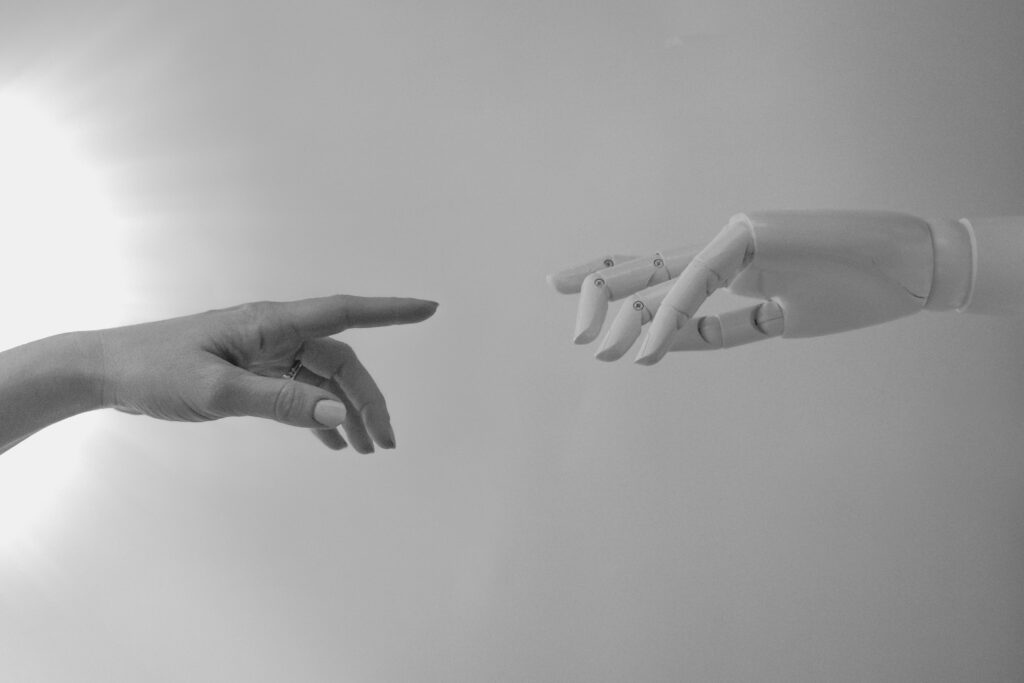
Photo by Tara Winstead, Pexels
Does it feel like robots are coming for your job? That doesn’t necessarily have to be the case. There is one thing that always differentiates us: our humanity.
f you’re like most people, you probably think there’s a good chance that artificial intelligence (AI) or automation will significantly impact the global job market. Yet surveys show that most of us think these disruptive technologies are primarily going to affect someone else — someone with a skill set or an educational background that lends itself to repeatable work. This is a risky assumption. Automation technology is evolving and getting more advanced every day.
Here’s the truth: the robots are not only coming — they’re already here. But that doesn’t mean we’re all out of a job. It means that we need to explore opportunities to humanize the future of work, to complement and even enhance AI, automation, and productivity.
So, what is automation technology and how do we solidify our jobs for the future? Can we collaborate with automation so it impacts our jobs in a positive way?
Let’s dig deeper into how automation and technology are affecting work for the long haul.
What is automation technology?
Automation technology, simply put, puts machines to work with the least amount of human input. Automation reduces lead times and solves unique needs and goals — without you. It sounds just like a robot taking your job, right?
That’s why we invited award-winning New York Times technology columnist Kevin Roose to discuss the impact automation is likely to have on our livelihoods. Roose shared that AI and automation are already changing the way we work. So how are these technologies shaping the future of our work?
During the research for his book, “Futureproof: 9 Rules for Humans in the Age of Automation,” Roose found that for hundreds of years, we’ve been predicting what machines can and can’t do — and that overall, we’re usually wrong.
These quotes really stood out:
- “I can state flatly that heavier-than-air flying machines are impossible.” — Lord Kelvin, 1895
- “There is no prospect whatsoever that the employment of electronic digital computers in the field of translation will lead to any revolutionary changes.” — Yehoshua Bar-Hillel, 1962
- “You won’t get the best seating or the best fares … what happens if you just press the wrong button?” —travel agency owner on automated ticketing, New York Times, 1984
The disruptive technologies that would prove each of these predictions wrong went on to reshape economies and workforces forever. Yet at the time, each statement reflected widely-held beliefs.
In the 1950s, for instance, people were using tools like Rolodexes to manage their new leads. There was no way to find out more information about the potential customer or share it with a team. Today, with the evolution of powerful, automated CRMs, sales and support agents are working together to create a seamless customer experience for every new lead.
Outside of sales, there are many jobs that are being shaped by the changing landscape of automation information technology.
How are automation and technology affecting work?
You may still think of robots on the assembly line as the typical agent of job displacement, however, AI has made advances in fields that many people never imagined were vulnerable to automation. Here are just a few:
- Healthcare: Machine-learning algorithms can diagnose some cancers or perform x-rays more accurately than human radiologists. Other AI applications in the works can detect illnesses that range from cancer to Parkinson’s disease from simply smelling human breath.
- Creative: AI can compose music, write prose, build video-game levels, and write various types of content on the web.
- Software: With the help of automation technology, anyone can learn how to code. Low-code or no-code development platforms take the complexity out of writing computer programs.
- Data analysis: AI and machine learning analyze data sets to identify patterns and trends. With the advancements in automation information, they can report real-time insights and predict, in some cases, what’s likely to happen next.
- Social Influencers: Some of the biggest social-media influencers aren’t human — they are AI-designed models.
- Application Development: Given the ability AI has to quickly process large data sets, it’s able to create artificially intelligent applications that outperform human-created AIs.
- Speech Recognition: Whether it’s adding items to your shopping list, or producing meeting minutes from Zoom calls, AI applications can more accurately capture and process what they hear than many humans.
As Roose was writing about the inroads AI was making, he began worrying about his own replaceability as a journalist. He embarked upon a path to research how we can avoid being replaced by robots, and how we can future-proof our careers while still using automation.
How to future-proof your career (and still embrace automation)
What can we do to protect our jobs from being replaced by AI and robots?
There is good news and bad news. First, the bad news. Pretty much every job as it exists today can, in some way, be automated. In all honesty, there isn’t any technology-proof job or career path for the long-term.
The good news? Human creativity and resolve is at an all-time high. And it’s not limited to any job or role. By simply embracing your humanity (something a robot can never do) you have the power to connect with your career, your team and scale for the future.
This is not a time to panic — it’s a time to build on the roles and capabilities that can be automated to deliver new value at every level.

As AI drives down the price of goods and automated services, it also increases the value of human goods and human experiences. It rewards those who are good at creating these new things in collaboration with machines.
With this in mind, there is one primary thing you can do to make your job a little more future-proof, regardless of what it is: not so ironically, simply be human.
The best way to differentiate yourself is through your humanity and creativity, not your productivity. Accentuate the uniqueness of human labor involved in what you do or what you make — whether it’s creating a ceramic bowl, providing customer service, or selling a technology product. How you show up in any given moment to be present, aware, and ready to participate — that’s your human differentiator.
Think beyond using AI and automation to work as fast, at scale, and efficiently as possible. Make that human touch more visible and more valuable. This is what the human economy is about: experiences and feelings that machines cannot replicate.
The human connection is especially crucial in customer service. Our research shows that 76% of customers expect companies to understand their unique needs, yet only 34% feel like companies actually treat them as individuals.
“Any company that is not investing in this area is putting their entire business at risk,” Lidiane Jones, executive vice president and general manager of Salesforce Digital Experiences, told Forbes. Businesses can deliver personalized, connected experiences with customers by layering AI with powerful service and marketing innovations, she added.
Experiences are personal on every side. That’s what makes them special. They involve human beings and in reality, it’s that humanity combined with meaningful experiences that we’re going to seek out and pay for.
To outpace the bots, we encourage you to embrace the automation technologies that help your team grow. If you’re interested in hearing how automation can help scale your career, find out more about how we build humanity into our workflow.

Original post, Salesforce






